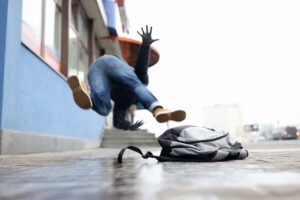
Slip and fall accidents can happen unexpectedly and result in significant injuries. When these accidents occur due to hazardous conditions or negligence on someone else’s property, legal consequences may follow.
As in many other jurisdictions, specific laws and legal principles govern slip-and-fall cases in Connecticut.
This article will explore the legal consequences of slip and fall accidents in Connecticut, including potential liabilities, the concept of premises liability, and the importance of seeking legal assistance from a Connecticut personal injury lawyer.
Premises Liability in Connecticut
In slip-and-fall cases, the legal doctrine of premises liability often comes into play. Premises liability holds property owners or occupiers responsible for maintaining safe conditions on their premises, preventing foreseeable harm to visitors.
In Connecticut, property owners owe a duty of care to individuals who are lawfully present on their property.
Establishing Negligence
To succeed in a slip and fall case in Connecticut, the injured party (plaintiff) must establish negligence on the property owner or occupier. Several elements need to be proven:
- Duty of Care: The plaintiff must demonstrate that the property owner or occupier owed them a duty of care. This duty typically entails maintaining the property reasonably safely and promptly addressing any known hazards.
- Breach of Duty: The plaintiff must show that the property owner or occupier breached their duty of care. Your New Haven personal injury lawyer can establish this by proving that the owner or occupier knew or should have known about the hazardous condition and failed to take reasonable steps to address it.
- Causation: The plaintiff must establish a direct causal link between the hazardous condition and their injuries. It is necessary to show that the condition was a substantial factor in causing the slip and fall accident and resulting harm.
- Damages: Lastly, the plaintiff must provide evidence of the injuries from the slip and fall accident. This can include medical expenses, pain and suffering, lost wages, and other losses.
Comparative Negligence in Connecticut
Connecticut follows the doctrine of comparative negligence in personal injury cases, including slip and fall accidents. Under comparative negligence, the court assesses the degree of fault of the plaintiff and the defendant.
If the plaintiff is found partially responsible for their own injuries, their compensation may be reduced in proportion to their percentage of fault. However, if the plaintiff is not more than 50% at fault, they may still recover compensation. Working with a Middletown personal injury lawyer can help to improve the odds of winning your case.
Statute of Limitations
Being aware of the statute of limitations is crucial for filing a slip and fall lawsuit in Connecticut. The statute of limitations sets a time limit within which a lawsuit must be filed.
In Connecticut, the general statute of limitations for personal injury cases, including slip and fall accidents, is two years from the date of the injury. It is important to consult with an attorney promptly to ensure compliance with the applicable deadlines.
Importance of Seeking Legal Assistance
Navigating the legal complexities of slip-and-fall cases in Connecticut can be challenging without proper legal guidance. Engaging the services of an experienced personal injury attorney can greatly enhance your chances of a successful outcome. Here are some reasons why seeking legal assistance is crucial:
1. Knowledge of Connecticut Laws: An attorney specializing in personal injury law in Connecticut will have in-depth knowledge of the state’s specific laws and regulations.
They can navigate the legal landscape, understand the relevant statutes of limitations, and apply the appropriate legal principles to your case.
2. Investigation and Evidence Gathering: A skilled Bristol personal injury lawyer will conduct a thorough investigation to gather evidence supporting your claim.
This can include obtaining incident reports, interviewing witnesses, and examining the property conditions during the accident. Having solid evidence is crucial in establishing negligence and liability.
3. Negotiation and Advocacy: An experienced personal injury attorney will skillfully negotiate with insurance companies or the opposing party’s legal representation to seek fair compensation on your behalf.
They will be prepared to advocate for your rights in court if a settlement cannot be reached.
4. Maximizing Compensation: An attorney will assess the full extent of your damages, including current and future medical expenses, lost wages, and pain and suffering.
They will work diligently to ensure that you receive the maximum compensation you deserve for your injuries and losses.
Conclusion
Slip and fall accidents can lead to severe injuries and have legal consequences, especially when negligence or hazardous conditions are involved.
In Connecticut, understanding the concept of premises liability, establishing negligence, and abiding by the statute of limitations is crucial for pursuing a successful claim.
By seeking legal assistance from a knowledgeable Bristol personal injury lawyer, you can protect your rights, navigate the legal complexities, and pursue fair compensation for your injuries and damages.

